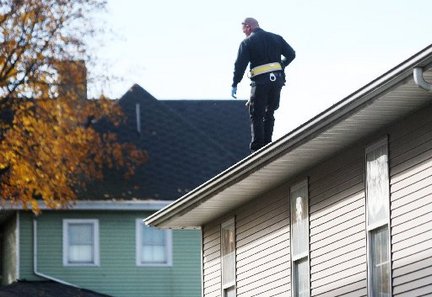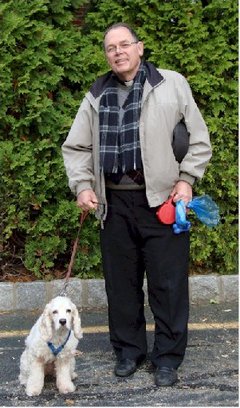The Star-Ledger
October 29, 2009
http://www.nj.com/news/index.ssf/2009/10/nj_911_dispatcher_unable_to_de.html
 |
| A crime scene investigator checks the house gutters and roof top for evidence during the continuing investigation into the murder of Rev. Edward Hinds, at the home of the alleged murderer, Jose Feliciano in this photo taken Monday. Police traced the priest’s cell phone near Feliciano's home. Photo by Jerry McCrea/The Star-Ledger |
CHATHAM BOROUGH -- Minutes before he was killed, the Rev. Edward Hinds dialed 911 from his cell phone, but help never arrived. The State Police received the call, but the dispatcher was unable to determine the location of the emergency.
An investigation into last week’s murder of the beloved 61-year-old Catholic priest from Chatham has highlighted a glaring flaw in the state emergency response system. It is not a fault of the police, but of the technology.
State officials said dispatchers are sometimes unable to locate a distressed caller using a cell phone. While the state has spent at least $60 million on upgrades in the past five years, outdated phone technology and lagging police equipment — and the occasional glitch — can hamper emergency efforts.
Industry experts said cell phones, which are quickly replacing landlines in U.S. homes, are a double-edged sword for emergency management. On one hand, the public can contact police from virtually anywhere on a moment’s notice. On the other hand, cell phones are not tethered to an address like landlines, making it more difficult for police to quickly locate the caller.
This failure is critical in a state like New Jersey, where more than half of the 7.5 million 911 calls made last year came from cell phones, a state spokeswoman said.
Hinds was found dead last Friday morning in the rectory of St. Patrick church in Chatham with 32 stab wounds and multiple injuries. The church janitor, Jose Feliciano, 64, has been charged in his slaying.
It’s unclear why the State Police dispatcher could not electronically locate Hinds.
State Police spokesman Capt. Gerald Lewis said the division has the technology, but data wasn’t received in this case. Information on Hinds’ phone has not been made available.
Hinds dialed 911 at 5:27 p.m. last Thursday, requesting police help, Morris County authorities said. The call was routed to a dispatcher in West Trenton. When the line went dead, the dispatcher tried twice to reach the caller, The first attempt went straight to voice mail. The second call was answered by Feliciano, who said there was no emergency, Morris County Prosecutor Robert Bianchi has said.
Assemblyman Frederick Scalera (D-Essex), who serves on the state’s 9-1-1 Commission, hopes better equipment and software will be fully installed within three years and improve the system.
"It would be impossible for a cell phone to tell you what address you’re at," Scalera said. "But when it is completely up and running, it can tell you within so many feet of where the call came from."
Even if police have the latest technology, the system is not foolproof, as radio waves can falter, said David Aylward, former director of the former Comcare Emergency Response Alliance, a nonprofit advocacy group.
 |
| Father Edward Hinds and his dog, Copper, in an undated photo posted on the website of Saint Patrick church in Chatham Borough. |
In New Jersey, a variety of factors — including geographic location, phone technology, and the availability of nearby call centers — determine whether 911 calls from cell phones are routed to local cops or State Police headquarters. Law enforcement agencies are sometimes able to narrow down a caller’s location using longitude and latitude.
State Police spokesman Capt. Gerald Lewis said they are investigating the 911 call Hinds made, adding, "We just want to make sure everything was done properly."
In 2004, the state began collecting fees intended to support New Jersey’s emergency operations, from bioterrorism response to 911 systems. For every phone line — both landline or cell phone — residents pay 90 cents on their bills.
Out of at least $612 million raised since then, Treasury spokesman Tom Vincz said, $60 million has been invested in 911 call centers, called public safety answering points, or PSAPs.
Some state officials said more of the money needs to directly fund 911 call centers.
"If you keep diverting the money, you’re not going to have an effective system," Assemblyman Michael Doherty (R-Warren) said. "If you’re going to have these taxes, you ought to use them the way you’re supposed to."
Vincz said no funds have been diverted away from the fund's original statutory purposes.
With an estimated 280 million cell phones in the nation today and growing, Americans are ditching landlines faster than ever. One of every five homes only has cell phones, according to a federal survey.
Shelley Bates, spokeswoman for the Office of Information Technology, said 57 percent of the state’s 7.5 million 911 calls in 2008 were made from cell phones.
The Federal Communications Commission has required phone companies to supply location data to law enforcement since 1996.
Paul Linnee, a consultant in the emergency communications industry, said the most recent technology allows dispatchers to see the longitude and latitude, as opposed to just the caller’s 10-digit phone number and the cell tower that relayed the call. Still, pinpointing cell calls may take some work, he said.
For example, in an urban area, a dispatcher might be able to determine that the call was placed from a particular apartment or office building, but wouldn’t know which floor or unit it was made from, Linnee said.
A church janitor accused of killing a Catholic priest last week is scheduled to have his first appearance in court Thursday before Superior Court Judge Thomas Manahan in Morristown, officials said.
A bail hearing for Jose Feliciano, 64, of Easton, Pa. who was arrested Saturday and charged with killing Rev. Edward Hinds of St. Patrick Church in Chatham on Thursday, was scheduled to be held Tuesday. It was abruptly postponed, and Feliciano was transferred from Morristown Memorial Hospital to the Ann Klein Forensic Center, a psychiatric hospital in Trenton.
Feliciano has been held in lieu of $1 million bail since his arrest. He suffers from various ailments and has remained hospitalized since Friday, after Hinds’ body was discovered at the church rectory stabbed 32 times after the pastor failed to show up in church for 8 a.m. Mass.
Funeral arrangements for Hinds have been finalized. The "Rite of Reception of the Body" will occur at 11 a.m. on Friday at the Chatham church at 41 Oliver St. A viewing will be from 11 a.m. to 10 p.m. At 4 p.m., a brief prayer service for children will take place. The "Vigil for the Deceased" will take place at 7 p.m.
The Mass of Christian Burial will take place Saturday at 10 a.m. at the church. The mass will be simulcast in the Parish Center Gym, East/West Rooms, and Cafeteria. The burial will be private.
Any original material on these pages is copyright © BishopAccountability.org 2004. Reproduce freely with attribution.